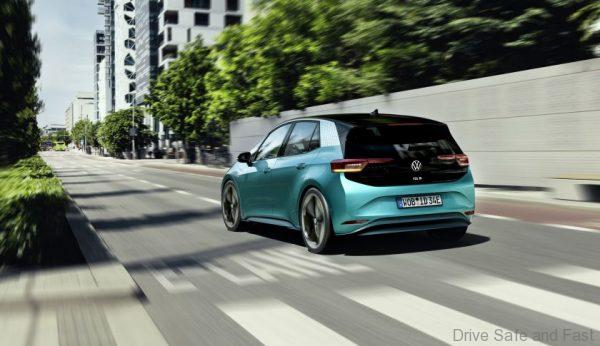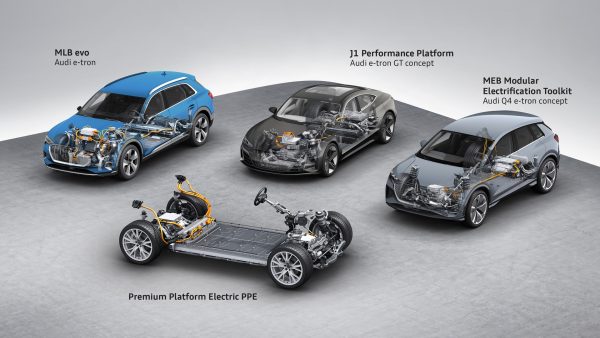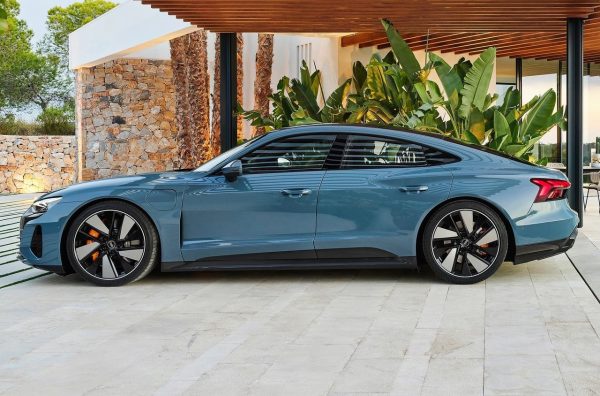The Scalable Systems Platform (SSP) will take over from the current MEB and PPE platforms
The Volkswagen Group has announced its plan to develop a new, all-electric platform that will underpin the majority of EVs across its brand portfolio.
Known as the Scalable Systems Platform (SSP), the fully digital and highly scalable architecture is set to replace the current Modular Electric Drive Toolkit (MEB) and Premium Platform Electric (PPE) platforms by 2025.

First introduced several years ago, the MEB platform forms the basis for several notable models including the Volkswagen ID.3 and ID.4, Skoda Enyaq as well as the upcoming Audi Q4 e-tron and Q4 Sportback e-tron.
Meanwhile, the PPE platform, which employs the same 800-volt technology as the Taycan‘s J1 platform, will be shared between Audi and Porsche. It has been previously reported that the electric version of the Macan and the Q5 e-tron will be underpinned by this platform.

The SSP will be part of Volkswagen Group’s standardised technical foundations, which include hardware, software, batteries and charging, as well as mobility services.
On the matter of software, a VW.OS operating system supplied by Volkswagen’s very own Car.Software-Org. is set to be deployed in its vehicles, starting with Version 1.2 in the PPE, followed by Version 2.0 in the SSP.

For batteries and charging, the Group will introduce a unified cell in 2023 that will be utilised in 80% of its electric vehicles across brands. The move will allow them to reduce the cost of battery cells by up to 50% in the entry-level segment and by up to 30% in the volume segment. Six cell factories will be built in Europe to accommodate the demand.

PRESS RELEASE
The Volkswagen Group is stepping up the pace of its transformation into the leading provider of individual mobility in the electric and fully connected age. To this end, the Group will systematically enhance its successful platform strategy. In future, vehicles and services of all Group brands are to be based on largely standardized technical foundations. The Group’s new platform roadmap has four elements: Hardware, software, batteries and charging, as well as mobility services. This is how the Volkswagen Group will reduce complexity, leverage economies of scale and synergies between brands, and generally accelerate the Group’s transformation, which has already begun. In order to secure the investments in future technologies, the Group will continue to focus its core business and strengthen its financial foundation.
In this context, Herbert Diess, CEO of Volkswagen Aktiengesellschaft, said at the presentation of the financial statements for the past fiscal year: “Electrification and digitalization are changing the vehicle faster and more radically than ever before. Economies of scale are absolutely critical for both issues. Our platform roadmap will put us in an even better position to tap the full potential of our Group alliance. By pooling the strengths of our strong brands, we will thus be able to scale up our future technologies even faster and maximize the number of people benefiting from them.”
In the Modular Electric Drive Toolkit (MEB), Volkswagen already has one of the most powerful all-electric platforms in the industry. This platform is now being scaled up worldwide with production in Europe, China and the USA. By 2022, 27 MEB-based models will be offered throughout the Group. In addition, as early as next year, the Group will launch its first vehicles based on the Premium Platform Electric (PPE), with faster acceleration, higher ranges and shorter charging times. By the middle of the decade, the Group wants to develop the Scalable Systems Platform (SSP), the next generation of all-electric, fully digital and highly scalable vehicle platforms, on which models of all brands and segments can then be built.
For on-board connectivity and software, Volkswagen is aiming to achieve synergy effects across all brands in the coming years. All of this will be based on the VW.OS operating system supplied by Car.Software-Org., which was established in 2020. Version 1.2 is set to follow in the PPE. Version 2.0 will subsequently be rolled out throughout the Group with the SSP. By then, the in-house share of car software development is set to rise from the current 10 percent to 60 percent. Car.Software-Org. is also developing the technical foundations for autonomous driving, data-based business models and new mobility services.
In addition, Volkswagen is also pursuing a platform strategy for batteries and charging: Starting in 2023, the Group will introduce a unified cell to be scaled up around the world. By 2030, the unified cell is to be installed in around 80 percent of all the Group’s electric vehicles across brands. Volkswagen will thus reduce the cost of battery cells by up to 50 percent in the entry-level segment and by up to 30 percent in the volume segment. To ensure that demand for battery cells can be met, Volkswagen and its partners plan to build six cell factories with a total capacity of 240 gigawatt hours in Europe by the end of the decade. The Group is also driving the expansion of the public fast-charging network in Europe, China and the USA.
The fourth element of the new platform roadmap comprises mobility services and other services. These include, among others, the MOIA ride pooling service, the WeShare car sharing offering and flexible subscription services from Volkswagen Bank. As it evolves its service offerings, Volkswagen is acquiring systems expertise which it is developing with partners as necessary.
Herbert Diess: “Volkswagen will also be the platform champion in the new world of mobility. Our roadmap clearly sets out how this will be achieved, allowing us to accelerate our transformation into a software-driven mobility group. We will embark on this journey with a newly configured Board of Management and on a solid financial foundation. Our good performance in 2020, a year dominated by crisis, will give us added momentum.”

